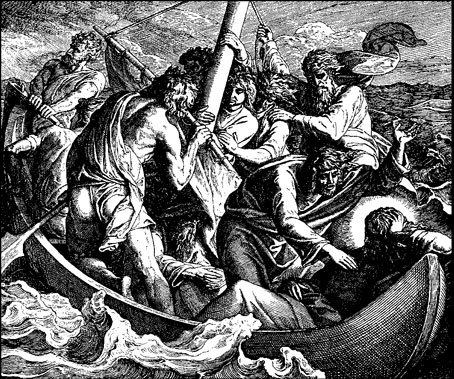Aug
6
2009

“Then they came to Jesus, and saw the one who had been demon-possessed and had the legion, sitting and clothed and in his right mind. And they were afraid.” Mark 5:15
There’s a discussion about tatts and piercings going on at dougwils.com
Like Jello on a Plate and Unleashing Your Inner Fundamentalist
Here’s my 2 cents:
Continue reading
2 comments | tags: Culture, Doug Wilson | posted in Christian Life
Jul
24
2009
from Manifesto on Psalms and Hymns
by Douglas Wilson (Introduction to the Cantus Christi Hymnal)

A common practice in our day is for Christians to speak of the “culture wars.” By this they usually mean the political and cultural skirmishes between leftist secular thinking and the more moderate and traditional thinking of believers. But the problem is that the phrase “culture wars” is a particularly inept way to refer to this problem. Continue reading
Comments Off | tags: Culture, Doug Wilson, Liturgy, Modernism, Music, Psalms, Worship | posted in Christian Life, Quotes
Jul
10
2009
Can trying to be relevant make a Christian irrelevant? John Piper writes:
Continue reading
Comments Off | tags: Culture, John Piper, Peter Leithart, Spurgeon | posted in Christian Life, Quotes
Jun
22
2009

James Jordan writes:
High culture naturally self-destructs apart from true faith. Lacking a true sabbath context, the increase of leisure time in high cultures eventuates in high amounts of psychic stress, decadence, and homosexuality. We see this in America today. Unless a high city culture is founded in the Biblical principles of true worship and free labour, it will collapse under its own decadence.1
Continue reading
Comments Off | tags: Adam, Contentment, Culture, James Jordan, Peter | posted in Christian Life
Jun
22
2009
 “…the crisis of fatherhood, in its many forms, is at the root of most disorders in this late stage of Western civilization. And the root is intimately connected to the loss of our consciousness of the hierarchical nature of the created order. Large numbers of people not only seem unable to believe in God, but also cannot conceptualize Him in their thoughts and their hearts. The icon in the heart—the icon of fatherhood—is either damaged or absent entirely. Continue reading
“…the crisis of fatherhood, in its many forms, is at the root of most disorders in this late stage of Western civilization. And the root is intimately connected to the loss of our consciousness of the hierarchical nature of the created order. Large numbers of people not only seem unable to believe in God, but also cannot conceptualize Him in their thoughts and their hearts. The icon in the heart—the icon of fatherhood—is either damaged or absent entirely. Continue reading
Comments Off | tags: Culture, Fatherhood, Michael O'Brien | posted in Biblical Theology, Christian Life, Quotes
May
27
2009

“I am very clever king… tok tok tok tok… I am super genius… I am robot king of the monkey thing… compute… compute.”
–Julian, King of the Lemurs, Madagascar (2005)
Concerning the ridiculous hype over a long dead lemur trotted out in desperation after a quarter of a century to prop up a failed theory, Don Batten writes:
The orchestrated multimedia blitz over this fossil is almost unbelievable. The paleontologists even got Michael Bloomberg, Mayor of New York, to officiate at the public “launch” of Ida (the cute nickname for the fossil), when it was unveiled—like a new sculpture by a famous artist—to the assembled journalists.
According to brilliant fool David Attenborough, this little creature “is going to show us our connection with the rest of all mammals.” That’s a lot to expect from a dead lemur. Guess they’ll have to call in DreamWorks for some CGI for Ida to accomplish this.
Continue reading
20 comments | tags: Culture, Evolution, Film | posted in Creation
May
22
2009
Ted Baehr and Tom Snyder’s review of Angels and Demons points out that in the book, the mad clergyman’s assassin was a rabid Muslim. In the movie, apparently he’s a lapsed Catholic instead, killing for money instead of for Allah. Wouldn’t want to offend any Muslims now, would we?
Mark Hadley comments:
Yes, strangely the ‘assassin’ is one area where the film goes harder at Christianity than the book does.
In the book the Hassassin, as he is called, is clearly a sexual deviant who enjoys inflicting pain. In the film he’s been transformed into a compassionate killer. Sure, he murders cardinals, but that’s just because it’s his job. He actually lets Robert Langdon and Vittoria Vetra go free because they’re not on his hit list, and he throws them a warning to be careful of those men of God, implying they are the unscrupulous ones. This is a fact carried home by his employers blowing him up moments later.
Yes, I feel that it was pretty clear that the producers thought Islam should be off limits, but why go the extra mile? Why not just make the assassin a bad man, instead of setting him up as an additional witness to the church’s perfidy?
Dan Brown and Ron Howard would be brave men if there was such a thing as Christian jihad. But there isn’t and they are not. So, this alteration reveals both their cowardice and the fountain of their work: not hatred of false religion, but hatred of Christ Himself. They are the ones with the jihad.
1 comment | tags: Culture, Film, Islam | posted in Apologetics, Christian Life, Ethics
May
18
2009
 Slumdog Millionaire might only be a bag full of clichés in a veneer of contemporary moviemaking, but as with Fight Club, the ending reminded me of the Last Days.
Slumdog Millionaire might only be a bag full of clichés in a veneer of contemporary moviemaking, but as with Fight Club, the ending reminded me of the Last Days.
There are two brothers, and the older one resorts to guns and Dutch courage to deal with opposition, which puts him in good stead with the biggest gangster in town. He helps his younger brother rescue the girl, but claims her for himself (for all the wrong reasons).
The film ends with the younger brother rescuing the wounded “bride”. Both brothers end up “in the money”: the faithful younger brother in a miraculous game show win, the older zealot in a bathtub (grave) full of gangster cash (blood money) before a deadly ‘suicidal’ shootout.
It might be “raw, unleavened melodrama” (as one critic put it), but it’s a story written by the Bible into the fabric of our culture, and one we are still hungry for despite our unbelief.
Comments Off | tags: Culture, Film | posted in The Last Days
May
17
2009
Doug Wilson on Craig Blomberg’s review of N. T. Wright’s book-length response to John Piper’s book (breath):
“Then there is Blomberg’s misunderstanding of the relationship of the Reformers and culture.
‘Fixate on the Reformers’ (understandable) preoccupation with how an individual becomes right with God (crucial in its day against medieval Catholicism) and one may miss the bigger picture, in which the fulfillment of God’s covenant with Abraham through the children of Israel as progenitor of the Messiah looms even larger.’
Notice what is being juxtaposed here. The Reformers had an individualistic fixation on getting individuals into heaven when they die. But we, upon whom the new perspective has shone, now understand that there is a “bigger picture.” I see. And what did the Reformers do with their narrow vision? Well, they toppled kings, transformed laws, overhauled cultures, settled a continent, built nations, founded schools and colleges, inspired musicians and painters, and we could continue in this vein for quite a while. And what do we do, entranced as we are by the new perspective? We write academic papers, download podcasts of academic lectures that we can listen to in the privacy of our ear buds, and we go white in the face if conservative Christians suggest that Jesus might have an opinion about the ongoing slaughter of the unborn. John Piper, with his preaching on the pro-life issue, challenges the principalities and powers. The soft statism that goes with trendy theology these days does nothing of the kind — it simply suggests (but not too loudly) that we need kinder, gentler principalities and powers.”
Comments Off | tags: Abortion, Culture, Doug Wilson, John Piper, N. T. Wright, Reformers | posted in Quotes
Apr
27
2009
From John Barach’s blog:
The Fruit of Dispensationalism
In the Portland airport, on my way back home, I read a new book on eschatology by Auburn Avenue’s associate pastor, Duane Garner. Here are a few paragraphs to whet your appetite. In the context, Garner has been talking about Hal Lindsey’s recommendation that Christians retreat from society because things are going to get worse and worse until Jesus returns:
Continue reading
Comments Off | tags: Culture, Dispensationalism, Ethics, Postmillennialism | posted in The Last Days































